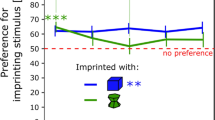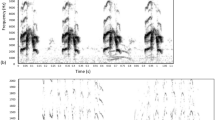Abstract
NEWLY hatched nidifugous birds do not behave as if they recognized their own kind as such. On the contrary, they react in the same way to a very wide range of stimulus objects by approaching them and by giving ‘pleasure’ notes when near them. Thus the birds become attached to the stimulus objects. Such imprinting normally occurs to parents or parent-substitutes. However, Collias1 suggested that simultaneous imprinting to siblings could account for the socialization of young birds. This suggestion was also made later by Weidmann2 and by Gray3, and has been implied by other students of imprinting.
This is a preview of subscription content, access via your institution
Access options
Subscribe to this journal
Receive 51 print issues and online access
$199.00 per year
only $3.90 per issue
Buy this article
- Purchase on Springer Link
- Instant access to full article PDF
Prices may be subject to local taxes which are calculated during checkout
Similar content being viewed by others
References
Collias, N. E., Auk, 69, 127 (1952).
Weidmann, U., Z. Tierpsychol., 15, 277 (1958).
Gray, P. H., J. Psychol., 46, 155 (1958).
Sluckin, W., and Taylor, K. F., Brit. J. Psychol. (in the press).
James, H., and Binks, C., Science, 139, 1293 (1963).
Author information
Authors and Affiliations
Rights and permissions
About this article
Cite this article
TAYLOR, K., SLUCKIN, W. Flocking of Domestic Chicks. Nature 201, 108–109 (1964). https://doi.org/10.1038/201108a0
Issue Date:
DOI: https://doi.org/10.1038/201108a0
Comments
By submitting a comment you agree to abide by our Terms and Community Guidelines. If you find something abusive or that does not comply with our terms or guidelines please flag it as inappropriate.



